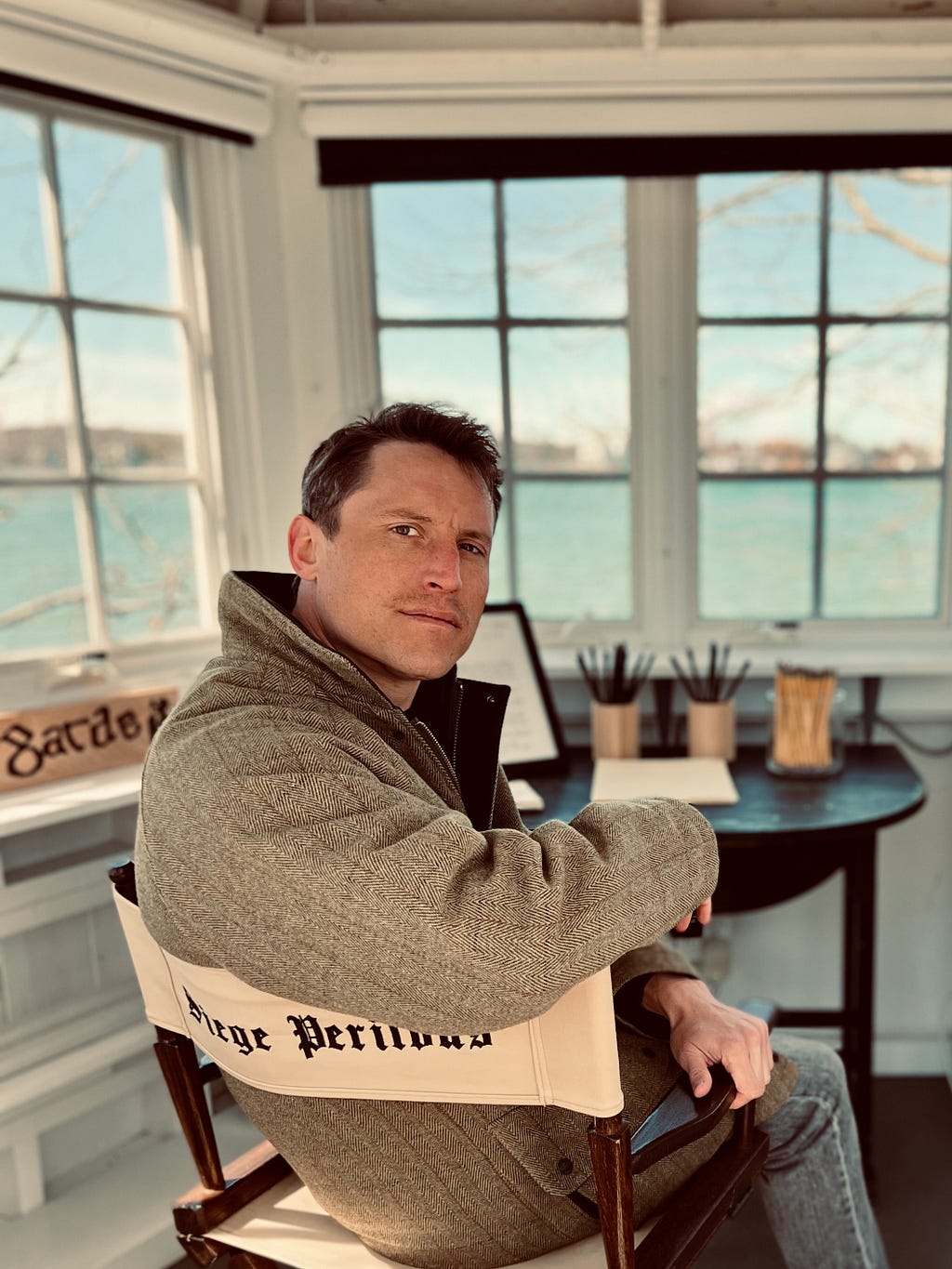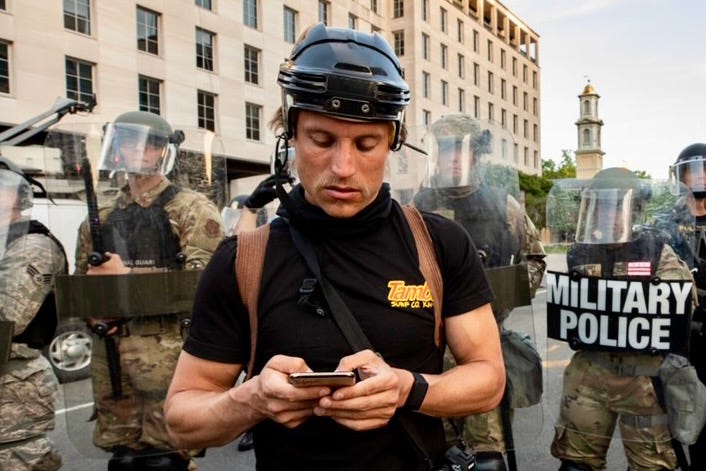
..Follow your gut. The most impactful moments of your life can come unexpectedly, and when they do you will be so filled with adrenaline and emotion that there will be no opportunity to think it through. If you’re comfortable running on your instincts rather than your reasoning, when the time comes you will be ready to execute rather than stop and think…
As part of my series about “authors who are making an important social impact”, I had the pleasure of interviewing Richie McGinniss. When the pandemic and subsequent civil unrest hit the shores of the U.S., McGinniss led a team of reporters through lawless zones across the country: DC, Seattle’s “CHAZ,” Portland, Kenosha, Minneapolis, Wauwatosa, the southern border, and Philadelphia, then back to DC for the 2020 election, Stop the Steal I, II, and January 6. His lifetime of surfing around the world and scrumming it in the corner on the ice came in handy when he embedded with and interviewed protesters/rioters of all creeds, all while enduring police beatings. Covering riots in Kenosha, Wisconsin, McGinniss witnessed Kyle Rittenhouse kill Joseph Rosenbaum, then testified as a key witness (and named victim) in the trial. Also recording the Capitol riot on January 6th, McGinniss has a firsthand understanding of how news events can be cannibalized and refashioned by the media.
Thank you so much for joining us in this interview series! Before we dive into the main focus of our interview, our readers would love to “get to know you” a bit better. Can you tell us a bit about your childhood backstory?
I grew up as the middle of three boys playing ice hockey, surfing, and generally creating a ruckus wherever we went. My first memory was Christmas morning at age two when my mom dropped a Cuisanart blade onto my foot and severed my big toe tendon in half, then my dad — an orthopedic surgeon — stitched me up. So it’s fair to say I have been comfortable in the midst of chaos since I was a kid. I was always interested in dark room photography, classic films, and history. My professional transition to news video production/editing seemed like a modern extension of those areas of passion, and the whole comfortable- in -chaos thing came in handy when the protests/riots swept across the country in 2020.
When you were younger, was there a book that you read that inspired you to take action or changed your life? Can you share a story about that?
Hunter S. Thompson’s Hells Angels changed the way I understood journalism and writing. I love the way that Thompson immersed himself in the story and put the reader right next to him in the moment. I love that style of narrative nonfiction and Hunter has an unparalleled ability to find comedy in chaotic moments of American history.
It has been said that our mistakes can be our greatest teachers. Can you share a story about the funniest mistake you made when you were first starting? Can you tell us what lesson you learned from that?
I had a camera turn off while filming a certain United States senator. The humiliation of having to tell a sitting senator that we had to repeat the last 20 minutes of the conversation taught me an important lesson: always test your gear because when the moment comes to roll cameras, you only get one shot.
Can you describe how you aim to make a significant social impact with your book?
I used writing to put a human face on the police, the peaceful protesters, the scurrilous agitators, and everyone in between. The civil unrest that took place in 2020–2021 was so politically charged that people only saw half the full reality based on where they consumed their news. This book provides a deeper, richer understanding of a period of social and political change that will inevitably be written about in history books for generations to come. I think my book appeals to readers regardless of their political ideations, which is uncommon in an era where every political book is about “here’s why my side is right and yours is wrong.”
Can you share with us the most interesting story that you shared in your book?
Approximately five minutes before I witnessed Kyle Rittenhouse shoot the first man who died on August 25, 2020 in Kenosha, Wisconsin, I found myself offering a White Claw spiked seltzer to a man sporting a handgun in his waist band. I had been walking with Kyle Rittenhouse as he patrolled the area with an AR-15 and a med kit asking anyone if they needed medical attention. I stopped to ask a group of men why they were yelling at Kyle because I wanted their side of the story. When I aimed my camera at them, the man with the gun in his waist band stood up and rested his hands on his waist menacingly. The man next to him was holding fragments of bricks and looked like he wanted to use them to smash my head. I put the camera away and used my “break glass in case of emergency” move, “does anyone want a white claw?”
To my surprise, the man with the pistol laughed and accepted my offer. I cracked the can and handed it over just as I saw Kyle Rittenhouse running down the road, now carrying his med kit around his back, the AR-15 slung around his chest and cradled in one arm while carrying a fire extinguisher with his other hand. Knowing that I had to pursue whatever event Kyle was running to, I bid the man sipping the spiked seltzer farewell. That was only minutes before I followed Rittenhouse to a parking lot where a man would chase him down and get shot dead. I would carry the man to the hospital in his dying moments, and go on to become a key witness and a named victim in the internationally prominent trial in Kenosha.
What was the “aha moment” or series of events that made you decide to bring your message to the greater world? Can you share a story about that?
After I got home from covering January 6, I sat down on the couch still covered in pepper spray and turned on the news. My roommate came downstairs and sat down next to me. Realizing what madness I had just witnessed, he said, “Well I guess that’s the ending to your book.”
In that moment I realized that I was one of a small handful of Americans who witnessed the full scope of the BLM protests/riots of 2020, as well as the MAGA violence that reached a crescendo at at the Capitol riots of January 6, 2021. I decided to write the book to preserve that moment in time: 20 years from now someone can pick up the book and get a feel for what it was like to be in the belly of the beast during the worst pandemic in over a century, and the subsequent protests which were some of the most significant and arguably the most widespread in the history of the United States
Without sharing specific names, can you tell us a story about a particular individual who was impacted or helped by your cause?
There was a young man whose life was held in the balance based on my ability to clearly convey the truth of what I witnessed to a jury of his peers. I witnessed this young man chased down by another individual, who screamed “fuck you” before he lunged for the young man’s rifle. This part of my testimony was good for his defense against the charge of reckless homicide in the case of the deceased. Another part of my testimony, namely that his first shot went past my legs and I was terrified for my life, was bad for his defense. But I still had to tell the truth regardless of the implications.
In the state where the shooting took place, an individual can be charged with reckless endangerment of another individual (me in this case) but acquitted on the basis of self defense (in this case the first man he killed). It was possible that my testimony would get him thrown into jail for endangering my life — with a potential sentence of 12 years. He was acquitted on all charges, and I guess my testimony helped get him off. So I ended up helping him; but at the time my job was to recall my objective observations on the night of the shooting, and let the jury and the legal system decide the rest.
Are there three things the community/society/politicians can do to help you address the root of the problem you are trying to solve?
Among the hundreds of thousands of peaceful protesters (and a smaller number of scurrilous agitators), I saw in the streets during 2020–2021, every one of them — regardless of where they fell on the political spectrum — felt that the system had failed to provide the opportunities for freedom and socio-economic prosperity that they deserved. In this modern, digitized age, the political tribe has superseded the small-town community as the primary support system in people’s lives. As local newspapers and small businesses are absorbed into the corporate machine, it’s important for politicians to place emphasis on community and family building amongst their constituents, rather than providing handouts for the corporate interests that fund their campaigns.
How do you define “Leadership”? Can you explain what you mean or give an example?
Leadership is teaching by example. My boss during my time covering the protests/riots was a former Jarhead named Geoffrey Ingersoll. He was always the first one in the office and he never asked his reporters to do anything he wasn’t willing to do himself. When the protests started and I began traveling to lawless zones with my fellow reporter, Shelby Talcott, Geoff told me, “If she ends up with a black eye and you’re not in the ICU, I’ll kill you myself.” He also told us to report what we say and avoid commentary even though that would get us more likes online. That was key because when the shit hit the fan, our objective reporting stood out amongst the rest of the noise.

What are your “5 things I wish someone told me when I first started” and why? Please share a story or example for each.
1. When you’re young, it’s about what you’re learning in your field rather than how much you’re making. I beat myself over the head while I was making 12 dollars per hour and bartending as a second job to make ends meet. Most of my friends took finance jobs when they graduated and I spent too much time thinking about how much everyone else was making. Looking back, even though I was getting paid peanuts, I was working alongside the best video editors, camera guys, lighting techs, and media professionals in the world. I am glad that I stayed in the grind for the long haul because it taught me how the whole institution of corporate news really works.
2. Authenticity is the new currency in our discourse. It’s easy to follow the pack and amass a huge following or an online “brand”, but the more you change your views to satisfy your audience, the less confident you will be when it comes time to speak up. An increasing online audience now places their trust in individuals they follow rather than big brands. Focus more on executing your role than getting likes on social media. I was tempted to take a publishing deal that gave me a broader reach (and probably more money) but all of the publishers told me I had to choose a political side if I wanted to sell books. My story is the story of being stuck in between: whether it was with an older and younger brother, the police and the protesters, the prosecution and defense, or an increasingly hardened left and right. That’s why I started my own publishing company, PigeonPress.com. Once I decided I was doing it on my own, my writing became more authentic, more fun to read, and more clear headed. In short, the book got good after I gave up on trying not to say the wrong thing rather than writing what I thought was right.
3. Fake it until you make it. I never went to grad school. I studied Arabic and Middle Eastern History in college and only became a professional video editor because I filmed a stunning reel using my drone (which at the time in 2014 was a novelty). I presented myself as a pro editor with the beautiful images I captured, but I didn’t actually learn to edit like a pro until I was working as one alongside some of the best editors in the business.
4. Follow your gut. The most impactful moments of your life can come unexpectedly, and when they do you will be so filled with adrenaline and emotion that there will be no opportunity to think it through. If you’re comfortable running on your instincts rather than your reasoning, when the time comes you will be ready to execute rather than stop and think.
5. Don’t be afraid to try something new (and fail). When I finished covering the civil unrest of 2020–2021, I realized that I was one of only a handful of people who witnessed some of the most historic and tragic events of that year. I knew I had to write a book about my experience, but I hadn’t written anything since a philosophy paper senior year of college. I encountered many challenges in learning how to write, but through happenstance I was put in touch with Anthony Swofford, the author of the hit book turned blockbuster movie, Jarhead. Swoff really helped me find my voice and I never would have been afforded that opportunity if I didn’t go out on a limb and put pen to paper!
Can you please give us your favorite “Life Lesson Quote”? Can you share how that was relevant to you in your life?
“When the going gets weird, the weird turn professional.” Hunter S. Thompson
Is there a person in the world, or in the US with whom you would like to have a private breakfast or lunch with, and why? He or she might just see this, especially if we tag them. 🙂
William Finnegan, the author of Barbarian Days. I love that book.
How can our readers further follow your work online?
You can follow me on social media platforms @richiemcginniss and you can get my book at richiemcginniss.com or pigeonpress.com
This was very meaningful, thank you so much. We wish you only continued success on your great work!
Social Impact Authors: How & Why Author Richie McGinniss Is Helping To Change Our World was originally published in Authority Magazine on Medium, where people are continuing the conversation by highlighting and responding to this story.
